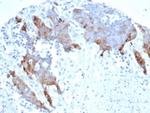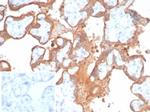Search Thermo Fisher Scientific
NeoBiotechnologies
Transglutaminase II (TGM2) (FN Binding Domain) Recombinant Rabbit Monoclonal Antibody (TGM2/6943R)
FIGURE: 1 / 2
Transglutaminase II (TGM2) (FN Binding Domain) Antibody (7052-RBM3-P1) in IHC (P)


Product Details
7052-RBM3-P1
Species Reactivity
Host/Isotype
Expression System
Class
Type
Clone
Immunogen
Conjugate
Form
Concentration
Purification
Storage buffer
Contains
Storage conditions
Shipping conditions
Product Specific Information
Antibody is stable for 24 months.
Positive Control: HUVEC cells. Endothelial cells in placenta, liver, brain, or breast carcinoma. Smooth muscle cells of any origin. Cellular Localization: Cytoplasm. Cell surface.
Specificity Comments: Tissue transglutaminase (tTG) is a 75 kDa monomeric globular protein expressed in the majority of cells and tissues. tTG localizes mainly in the cytoplasm but some tGT is present on the cell surface and is association with the extracellular matrix. In addition to its guanosine triphosphatase (GTPase) activity, tTG catalyzes the posttranslational modification of proteins by transamidation of available glutamine residues. Extracellular tTG is able to bind to and cross-link several ECM proteins and may function to stabilize the ECM and basement membranes. The protein is translated as a fully active enzyme and there is no evidence for proteolytic activation. High constitutive expression and accumulation of active tTG is observed in (among others) endothelial cells, platelets, vascular smooth muscle cells and epithelial cells of the lens. tTG is expressed at very low levels in skeletal muscle cells and neurons and may be difficult to detect in these cell/tissue types.
Target Information
Transglutaminase (TGase) catalyses the crosslink of proteins by forming e-(g-glutamyl) lysine isopeptide bonds and requires the binding of Ca2+ for its activity. In mammals, eight distinct TGase isoenzymes have been identified. Tissue transglutaminase (tTGase), also known as TGase 2, has four distinct domains: N-terminal b-sandwich, catalytic core and two C-terminal b-barrel domains. tTGase may have a role in cell death, cell proliferation, cell differentiation, and receptor-mediated endocytosis. In the Alzheimer's disease brain, the elevated tTGase activity is manifested by polymerization of a number of proteins, including Ab peptide, b-amyloid precursor protein and the tau protein, with formation of neurofibrillary tangles.
For Research Use Only. Not for use in diagnostic procedures. Not for resale without express authorization.
References (0)
Bioinformatics
Protein Aliases: C polypeptide, protein-glutamine-gamma-glutamyltransferase; Erythrocyte transglutaminase; G alpha h; G(h); G-ALPHA-h; GNAH; Heart G alpha(h); hhG alpha(h); Isopeptidase TGM2; Protein G alpha(h); Protein-glutamine deamidase TGM2; Protein-glutamine dopaminyltransferase TGM2; Protein-glutamine gamma-glutamyltransferase 2; Protein-glutamine histaminyltransferase TGM2; Protein-glutamine noradrenalinyltransferase TGM2; Protein-glutamine serotonyltransferase TGM2; RP5-1054A22.2; TG(C); TG2; TGase C; TGase H; TGase II; TGase-2; TGase-H; Tissue transglutaminase; Tissue type transglutaminase; Transglutaminase 2 C polypeptide; Transglutaminase C; Transglutaminase H; Transglutaminase II; Transglutaminase-2; tTG
Gene Aliases: TG(C); TGC; TGM2
UniProt ID: (Human) P21980
Entrez Gene ID: (Human) 7052

Performance Guarantee
If an Invitrogen™ antibody doesn't perform as described on our website or datasheet,we'll replace the product at no cost to you, or provide you with a credit for a future purchase.*
Learn more
We're here to help
Get expert recommendations for common problems or connect directly with an on staff expert for technical assistance related to applications, equipment and general product use.
Contact tech support
